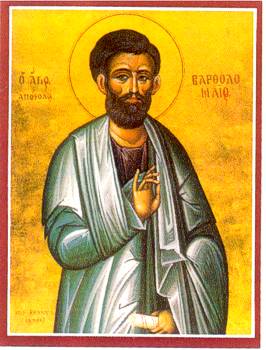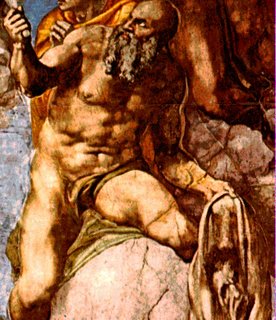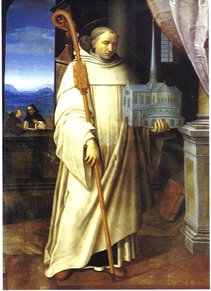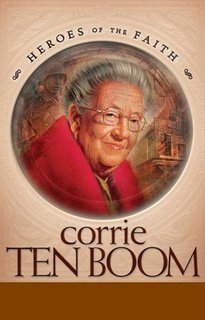
Saint Bartholomew was one of the Twelve Apostles, and probably a close friend of the Apostle Saint Philip. He was brought to Jesus by Philip, and Bartholomew’s name is usually mentioned in the Gospels in association with Philip.
He is called Bartholomew in the Gospels of Saints Matthew, Mark, and Luke. Most scholars believe that Bartholomew is called Nathaniel in the Gospel of John, and that Bartholomew was actually his last name. The name Bartholomaios means “son of Talmai” (Tolomai or Tholmai), an ancient Hebrew name. (The King of Gessur, whose daughter was a wife of David, bore the name; see 2 Samuel 3:3.) So, in this article, I will refer to him as Saint Nathaniel bar Tolomai (this would amount to him being known as Nathaniel son of Tolomai, just as Peter was called Simon bar Jonah, which would mean Simon son of Jonah.)
We see Saint Nathaniel bar Tolomai mentioned sixth in order as follows in the synoptic (this refers to the first 3 Gospels being similar in content, order, and statement) Gospels:
Matthew 10:3. James the son of Zebedee, and John his brother, Philip and Bartholomew, Thomas and Matthew the publican, and James the son of Alpheus, and Thaddeus
Mark 3:18. And Andrew and Philip, and Bartholomew and Matthew, and Thomas and James of Alpheus, and Thaddeus and Simon the Cananean:
Luke 6:14. Simon, whom he surnamed Peter, and Andrew his brother, James and John, Philip and Bartholomew,
And then again in the Gospel of Saint John:
John 1:45. Philip findeth Nathanael and saith to him: We have found him of whom Moses, in the law and the prophets did write, Jesus the son of Joseph of Nazareth.
1:46. And Nathanael said to him: Can any thing of good come from Nazareth? Philip saith to him: Come and see.
1:47. Jesus saw Nathanael coming to him and he saith of him: Behold an Israelite indeed, in whom there is no guile.
1:48. Nathanael saith to him: Whence knowest thou me? Jesus answered and said to him: Before that Philip called thee, when thou wast under the fig tree, I saw thee.
1:49. Nathanael answered him and said: Rabbi: Thou art the Son of God. Thou art the King of Israel.
1:50. Jesus answered and said to him: Because I said unto thee, I saw thee under the fig tree, thou believest: greater things than these shalt thou see.
1:51. And he saith to him: Amen, amen, I say to you, you shall see the heaven opened and the angels of God ascending and descending upon the Son of man.
Once more in John:
John 21:2. There were together: Simon Peter and Thomas, who is called Didymus, and Nathanael, who was of Cana of Galilee, and the sons of Zebedee and two others of his disciples.
The last time that Saint Nathaniel bar Tolomai is mentioned in the New Testament is in The Acts of the Apostles:
Acts 1:13. And when they were come in, they went up into an upper room, where abode Peter and John, James and Andrew, Philip and Thomas, Bartholomew and Matthew, James of Alpheus and Simon Zelotes and Jude the brother of James.
He is called Bartholomew in the Gospels of Saints Matthew, Mark, and Luke. Most scholars believe that Bartholomew is called Nathaniel in the Gospel of John, and that Bartholomew was actually his last name. The name Bartholomaios means “son of Talmai” (Tolomai or Tholmai), an ancient Hebrew name. (The King of Gessur, whose daughter was a wife of David, bore the name; see 2 Samuel 3:3.) So, in this article, I will refer to him as Saint Nathaniel bar Tolomai (this would amount to him being known as Nathaniel son of Tolomai, just as Peter was called Simon bar Jonah, which would mean Simon son of Jonah.)
We see Saint Nathaniel bar Tolomai mentioned sixth in order as follows in the synoptic (this refers to the first 3 Gospels being similar in content, order, and statement) Gospels:
Matthew 10:3. James the son of Zebedee, and John his brother, Philip and Bartholomew, Thomas and Matthew the publican, and James the son of Alpheus, and Thaddeus
Mark 3:18. And Andrew and Philip, and Bartholomew and Matthew, and Thomas and James of Alpheus, and Thaddeus and Simon the Cananean:
Luke 6:14. Simon, whom he surnamed Peter, and Andrew his brother, James and John, Philip and Bartholomew,
And then again in the Gospel of Saint John:
John 1:45. Philip findeth Nathanael and saith to him: We have found him of whom Moses, in the law and the prophets did write, Jesus the son of Joseph of Nazareth.
1:46. And Nathanael said to him: Can any thing of good come from Nazareth? Philip saith to him: Come and see.
1:47. Jesus saw Nathanael coming to him and he saith of him: Behold an Israelite indeed, in whom there is no guile.
1:48. Nathanael saith to him: Whence knowest thou me? Jesus answered and said to him: Before that Philip called thee, when thou wast under the fig tree, I saw thee.
1:49. Nathanael answered him and said: Rabbi: Thou art the Son of God. Thou art the King of Israel.
1:50. Jesus answered and said to him: Because I said unto thee, I saw thee under the fig tree, thou believest: greater things than these shalt thou see.
1:51. And he saith to him: Amen, amen, I say to you, you shall see the heaven opened and the angels of God ascending and descending upon the Son of man.
Once more in John:
John 21:2. There were together: Simon Peter and Thomas, who is called Didymus, and Nathanael, who was of Cana of Galilee, and the sons of Zebedee and two others of his disciples.
The last time that Saint Nathaniel bar Tolomai is mentioned in the New Testament is in The Acts of the Apostles:
Acts 1:13. And when they were come in, they went up into an upper room, where abode Peter and John, James and Andrew, Philip and Thomas, Bartholomew and Matthew, James of Alpheus and Simon Zelotes and Jude the brother of James.
Outside the references mentioned, there are no other instances of the name of Saint Nathaniel bar Tolomai being mentioned in the New Testament. What we know of him after the New Testament is not certain. There is no mention of him in ecclesiastical literature before Eusebius, who mentions that Pantaenus who was the master of Origen, was evangelizing in India, and was told that Saint Nathaniel bar Tolomai had preached there before him, and had given them a copy of the Gospel of Saint Matthew written in Hebrew. This was treasured by the Church there. India, was the name given to a vast area, and was not limited to the geographical area we know as India today. Other traditions indicate that Saint Nathaniel bar Tolomai also preached and evangelized in Mesopotamia, Persia, Egypt, Armenia, Lycaonia, Phrygia, and on the shores of the Black Sea.
There are conflicting traditions regarding his death. According to one, he was beheaded at Albanopolis in Armenia. According to another he was flayed (skinned alive) alive and crucified head down by order of Astyages, for having converted his brother, Polymius, King of Armenia. Because of the latter legend, he is often represented as a man holding his skin. His relics are at Saint Bartholomew-on-the-Tiber Church, in Rome, and in the cathedral in Canterbury, England.



